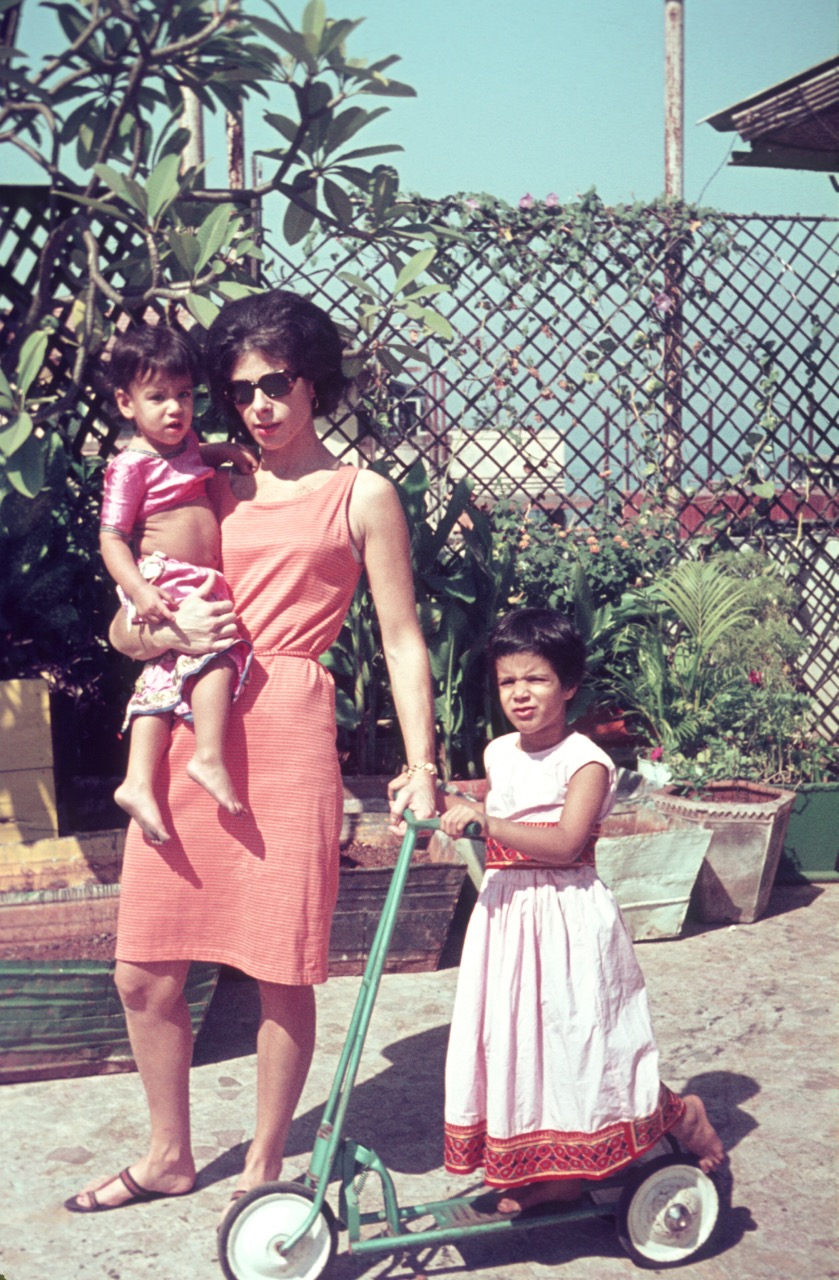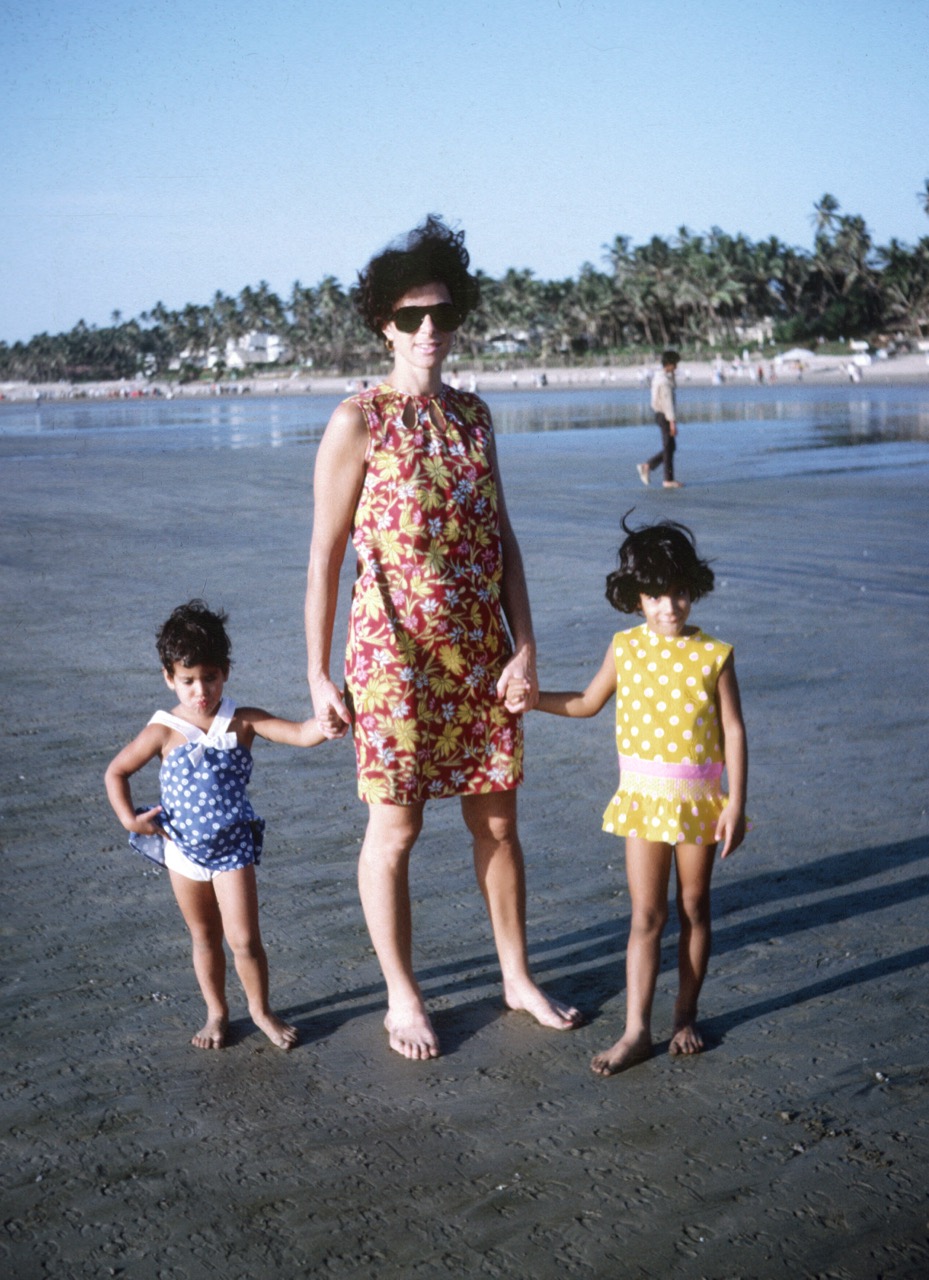
Courtesy of the author

Courtesy of the author
I didn’t know I was Jewish until my family left India in 1973 and my mother signed me up for Sunday school at the local synagogue in New Jersey. I’d grown up in Bombay (now Mumbai) in the sixties and seventies, the daughter of an Indian Jain father and an American Jewish mother — both religious minorities in a Hindu-majority country.
In a long poem “Tropics” in my poetry collection Forest with Castanets, I reflect on what India means to me. As a child, I chanted Jain prayers and participated in Jain rituals with my extended family, but that had little impact on my daily life. The Bombay of my youth was a mix of people of different ethnicities and religions who fit together comfortably enough, with their habits, prayers, and cacophonous haggling stitched into the city’s daily life.
Like everyone else, my sister and I celebrated the major public holidays of Hinduism. On Holi we hurled colorful powders at strangers on the streets and came home rainbow-colored and wild-eyed. On Diwali we twirled sparklers on our terrace overlooking the city, whose streets were a trail map of oil lamps, and clutched our sparklers tight until the small exploding stars burned down to our fists. We attended Christmas at Breach Candy swimming pool and watched plastic reindeers ferry Santa merrily along before claiming our gifts. We attended a few Friday night Shabbat services at the home of my mother’s best friend, who belonged to the centuries-old community of Baghdadi Jews in Bombay — although back then my mother was not interested in Judaism. We celebrated Rakshabandhan, a Jain holiday during which the girls in a family tied rakhis, or amulets, around the wrists of their brothers and male cousins, and they gave us small sums of money in return. The exchange of gifts and money was meant to symbolically reflect our understanding that our relatives would protect us from harm.
I didn’t really think that anyone would need protecting, though. I had a peaceful post-colonial life as a child, and didn’t have to reconcile that with the savagery of the Indian subcontinent’s division into India and Pakistan decades earlier. In 1947, between one and two million people were slaughtered during what was known as Partition — hacked or burned in their homes, on the streets they grew up on, or while trying to flee the carnage on foot or on trains. Hindus and Sikhs were on one side and Muslims on the other. It’s still shocking to think that the massacres came to Bombay — not only because of my calm childhood there, but also because Bombay has always been considered the most tolerant city in India. The country itself is one of the few places in the world where Jews were never persecuted. (Some have been there for thousands of years, practicing an Indianized version of Conservative Judaism.)
The country itself is one of the few places in the world where Jews were never persecuted.
Here’s how the Urdu writer Sadat Hasan Manto, who lived in Bombay from 1936 to 1947, described his beloved city to readers: “You can be happy here on two pennies a day or on ten thousand rupees a day, if you wish. You can also spend your life here as the unhappiest man in the world. You can do what you want. No one will find fault with you. No one will subject you to moralizing.”
Despite his idealistic vision of Bombay as a refuge for free thinkers, Manto, a Muslim, was driven from the city after Partition. Heartbroken, he left for Pakistan in January 1948. However, he continued to set many of his stories in Bombay, including one called “Mozelle,” about a coquettish and independent Indian Jewish woman and her Sikh lover, Tarlochan, which is set at the time of the communal riots of Partition.
In Manto’s story, Mozelle roams the city at will. She commands Tarlochan to shave his beard (which isn’t allowed for Sikhs) in order to marry her, then skips town with another lover. He finds a gentle Sikh girl to marry. Mozelle returns to find him worrying about his beloved, who lives in a Muslim district where Sikhs are being slaughtered as revenge for Sikh killings of Muslims up north. Thinking she is safe because she is a Jew, Mozelle breaks curfew and marches into the Muslim neighborhood, with her ex-lover trailing her. They enter the girl’s building, where Sikhs are being murdered one floor up. Mozelle puts her “Jewish” dress on the Sikh girl and pushes her out the door. She dashes up the stairs naked to distract the astonished mob, which chases her. She slips and tumbles down the stairs, and when her former lover removes his turban to cover her as she dies, she pushes it away: “Take away this rag of your religion. I don’t need it,” she says coolly, unashamed of her exposed body.
The story has always felt shocking to me, partly because of Mozelle’s unfathomable sacrifice and partly because of the viciousness of neighbor against neighbor.
The story has always felt shocking to me, partly because of Mozelle’s unfathomable sacrifice and partly because of the viciousness of neighbor against neighbor. We want to believe we are safe in our communities. Most of India’s minorities escaped the bloodletting of Partition, just as India survived World War II largely unscathed, and just as I enjoyed an easy life in my Cumballa Hill home with its expansive terrace with sea views. To me, Mozelle’s death makes stark the lasting madness of Partition. If you help a friend or neighbor, you, too, will be killed. Below the diverse and tolerant spirit that makes the city of Bombay so unusual is a ferocity that can be tapped by political and religious extremists. Manto dares us to condemn this brazen, fearless woman who protects the man and saves his beloved. Mozelle acts how Manto’s city compelled her to act. It is not the sexually liberated woman but ordinary Muslims, Sikhs, and Hindus who have sinned.
I moved to an all-white New Jersey suburb at the age of seven; Indian-Jain and Jewish made me a double minority in the States, too. But here, people were less tolerant. I was the wrong religion and the wrong color, and frequently elicited foul treatment from other children. My experience being persecuted was not at all comparable to the unfathomable dangers people faced during Partition, but, looking back, it was the first time that I experienced the hard truth that people are not considered equal. Manto resonates with me now because I can identify with the racism and bigotry in his stories — but also because he deftly chronicles, amid the horrors of Partition, people’s ordinary desires and motivations. Nothing seems to entirely dislodge Manto’s belief that people are resilient. Like Manto, I also felt exiled from a place I loved, and which seemed to love me back, and like Manto I became a stranger in a foreign land — surrounded not by the goings-on of a thriving, diverse metropolis with mazes of streets to wander and open ocean beyond, but by homogeneous square lawns and fences.
Spiritually speaking, I am at sea — conversant with many faiths, fully at home in none of them.

Courtesy of the author
Spiritually speaking, I am at sea — conversant with many faiths, fully at home in none of them. When I arrived in America, the Jain and Hindu holidays I grew up celebrating disappeared from our lives. I went to synagogue and switched my attention wholesale to being a Jew, guided by my mother, increasingly observant now that she was free of India. When I was seventeen, I went to Israel and felt at home there. But as I got older, what mattered most was an intellectual life I was beginning to live. It was Jewish writers and Jewish thought, not God, that I was after. Eventually I stopped believing in God, liberated by the freedom that Judaism allows for questioning your beliefs. In Jainism, this wasn’t an issue because there is no god, only Nirvana. But to be spiritual, now, is to wonder.
But as I got older, what mattered most was an intellectual life I was beginning to live. It was Jewish writers and Jewish thought, not God, that I was after.
As a non-believing half-Jain and a non-practicing half-Jew, I have my own, decidedly mixed feelings about religion — unlike Tarlochan, I’m suspicious of it, and unlike Mozelle, I don’t take it for granted. I light a few Hanukkah candles and note that it is Yom Kippur. I read Jewish books. I attend my sister’s Passover seder and swallow my words when I get to the parts about God. I envy the peace that Jainism gives some members of my family, and the tenets it shares with Judaism: kindness, being a mensch, trying to endure in the face of suffering. My two identities overlap easily for me because they are both part of my history. But Bombay, my old home, still exists for me as a place everything mixed naturally, and there is no need to define or question what I believe.
“I am a Bombay on the move,” Manto said when he left. “Wherever I happen to be, that is where I will make a world of my own.” Like him, I sometimes feel off-sides or displaced, but my religious loyalties are my own: “My temple lives in the sea, with memories and bare feet. / Its gifts are cold water, its only worshipper is me.”
Diane Mehta was born in Frankfurt, grew up in Bombay and New Jersey, studied in Boston, and now makes her home in New York City. Her second poetry collection Tiny Extravaganzas is out with Arrowsmith Press on Oct 15, 2023. Her essay collection Happier Far comes out in 2024. New and recent work is in The New Yorker, Virginia Quarterly Review, Kenyon Review, American Poetry Review, and A Public Space. Her writing has been recognized by the Peter Heinegg Literary Award, the Café Royal Cultural Foundation, and fellowships at Civitella Ranieri and Yaddo. She was an editor at A Public Space, PEN America, and Guernica. Her latest project is a poetry cycle connected to The Divine Comedy. She is also collaborating with musicians to invent a new way of working through sound together.